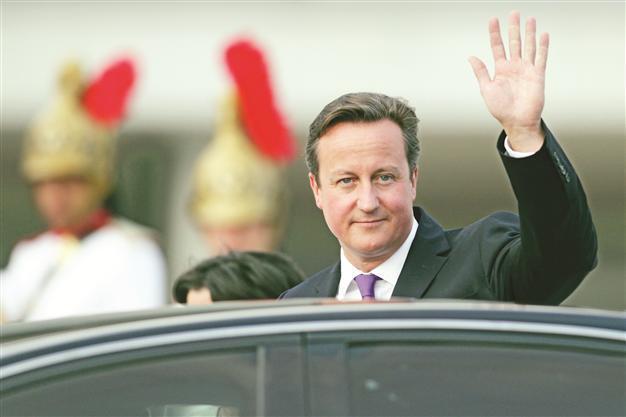Britain plays hardball on EU budget, threatens veto
LONDON / BRUSSELS

Britain’s Prime Minister David Cameron waves as he leaves after a meeting withBrazil’s President Dilma Rousseff at the Planalto Palace in Brasilia September 28, REUTERS photo
British Prime Minister David Cameron said yesterday he would use Britain’s veto to scupper European Union budget talks if necessary, warning the 27-nation bloc it needed to learn to live within its means.
Cameron suggested during an interview with the BBC, the EU should split its budget into two - one for the eurozone and one for the countries outside the single currency, including Britain.
Cameron, much to the delight of a powerful anti-EU wing of his Conservative Party, used the veto last year to keep Britain out of a European fiscal and economic pact aimed at resolving the eurozone debt crisis, Reuters reported yesterday. Britain must find more spending cuts to reduce the budget deficit, Cameron said Oct. 7, after a return recession this year raised speculation the government was set to miss its own deficit reduction targets.
Asked if Liberal Democrat Deputy Prime Minister Nick Clegg was correct to say that whoever won the 2015 election would have to introduce another tranche of austerity because of the size of the problem, Cameron said:
“Yes, he is right and actually it happens before that because we have to find 16 billion pounds of spending reductions for the year 2015-16. It starts before the general election and we need to do that,” Cameron said.
500 billion-euro war chestHis remarks came one day before when the eurozone is finally set to get its 500 billion euro rescue fund today when finance ministers will be meeting amid growing uncertainty over Greece’s tortuous debt bailout and whether Spain will need help in turn.
The formal launch and inaugural board meeting of the European Stability Mechanism comes just 10 days before the EU’s 27 leaders hold a Brussels summit, with expectations low that there will be any breakthrough on the big issues. Greece will not get the green light, either in Luxembourg or at the October 18-19 meeting, for the resumption of its drip-feed bailout after differences with its EU, Agence Fracne-Presse reported yesterday, European Central Bank and International Monetary Fund creditors.
EU-IMF-ECB officials have been locked in discussions with Athens over the need for more austerity measures while Greece insists it has done as much as it can and now needs more time to meet the troika’s targets.
Greek Prime Minister Antonis Samaras said Oct. 5 the country could not take more austerity and if its next aid tranche worth 31.5 billion euros ($40.6 billion) did not arrive soon, then by November state coffers would be empty. The October summit comes “considerably too early” to resolve the issues, a senior eurozone official said, given competing demands from the IMF, a newly-public alliance of eurozone hardliners Germany, the Netherlands and Finland, and Greek leaders from opposite ends of the political spectrum.
Germany, the Netherlands and Finland last week appeared to put in doubt key commitments made at a June summit, which notably agreed that the ESM would be able to recapitalise banks directly once a single banking supervisor is put in place, hopefully by the end of the year.
The three argued that the ESM should not be used to help those banks already bailed out before it became operational, a potentially heavy blow for the likes of Ireland which went bust after trying to keep its lenders afloat, and for Spain which has also recapitalised some of its banks and secured 100 billion euros from its eurozone partners to do more.
Another EU official said this stand on ‘legacy assets’ must have been “very unwelcome” for Spain and bailed-out Ireland.
